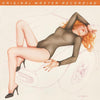



The Cars - Candy-O (Ultra Analog, Half-speed Mastering)
ORDER LIMITED TO ONE ITEM PER CUSTOMER
[click here to see more vinyl & SACD featuring The Cars]
Ric Ocasek – rhythm guitar, lead vocals
Elliot Easton – lead guitar, backing vocals
Greg Hawkes – keyboards, tenor saxophone on "Got a Lot on My Head", percussion, backing vocals
Benjamin Orr – bass guitar, lead vocals
David Robinson – drums, percussion
Written by Ric Ocasek
1 LP, standard sleeve
Limited numbered edition
Original analog Master tape : YES
Half-speed Mastering
Gain 2™ Ultra Analog
Heavy Press : 180g
Record color : black
Speed : 33RPM
Size : 12”
Stereo
Studio
Record Press : RTI
Label : MOFI
Original Label : Elektra
Recorded in 1979 at Cherokee Studios, Los Angeles
Engineered by Geoff Workman
Produced by Roy Thomas Baker
Remastered by George Marino
Originally released in 1979
Reissued in 2011
Tracks:
Side A :
- Let's Go
- Since I Held You
- It's All I Can Do
- Double Life
- Shoo Be Doo
- Candy-O
Side B :
- Night Spots
- You Can't Hold On Too Long
- Lust For Kicks
- Got A Lot On My Head
- Dangerous Type
Reviews :
"Dynamics are much improved on Candy-O, being consistently punchy and engaging. Drums in particular are rendered with greater realism, especially when you consider the already “larger than life” inherent production values. Thankfully the cymbals are reproduced cleanly without being overly bright. The new mastering also provides better treble and bass extension, along with a wider and deeper soundstage. Heck, there is even some space around Ocasek's vocals. Background instrumentals are also better separated in the mix." Michael Fremer, www.analogplanet.com
"After releasing a debut album that was considered perfect, packed with hits from beginning to end, the Cars faced an interesting dilemma on Candy-O. Should they make an exact replica and rake in the bucks? Or fool with the formula just enough to keep it interesting (while still emptying the tillers)? Working again with producer Roy Thomas Baker, the band wrote an almost entirely new batch of songs that captured the same pop highs as The Cars while sounding different in some important ways. The group were a little unhappy with how slick their debut sounded so they asked Baker to dial back the stacked vocals and make sure there was a little dirt in the machine. He did this while still capturing the band's pop essence, which the group made easy by cranking out almost as many timelessly great songs as they did on their debut, whether it was the punchy title track, the hard-rocking AOR radio staple "Dangerous Type," or the intensely fun "Let's Go." They also wrote some rollicking pop gems; "Since I Held You" and "It's All I Can Do" are a one-two punch of melancholy hooks, achingly honest vocals, and brilliant production that any band of the era would be elated to call their own. To go along with the good-time rockers and melodic tunes, they took a couple left turns with the robotic "Double Life" and Suicide tribute "Shoo Be Doo," cranked out some very solid synth-heavy new wave on "Night Spots" and "Lust for Kicks," and a couple fun rockers like "Got Lot on My Head" and "You Can't Hold on for Too Long." Candy-O is the rare follow-up to a classic debut that almost reaches the same rarified air. Throw in one more absolute classic hit single and it would have been there. As it stands, it may be one of the best second albums ever made, full of great songs, inspired performances, and sporting a still-perfect sound. If this had been the Cars' debut album, people might consider it a classic. Coming after The Cars, it has to be rated a little lower, but not by much." AllMusic Review by Tim Sendra
Ultra Analog™ : The GAIN 2 Ultra Analog™ Series stems from the use of the Gain 2 system, mastered at half speed from the original master tapes where possible, capturing and uncovering as before undiscovered sonic information.
Half-speed mastering. In half-speed mastering, the whole process is slowed down to half of the original speed. A typical 33 1/3 rpm record is cut at 16 2/3 rpm. The source material is also slowed down (reducing the pitch in the process) meaning the final record will still sound normal when played back. Slowing the whole process down allows more time, which means the end result sounds better and is more efficient — allowing engineering to minimize the effects of inherent limitations within the vinyl format. The result is a more accurate and more open high-frequency response in the half speed vinyl when compared with a normal speed recording.
Ratings :
AllMusic : 4,5 / 5 , Discogs : 4,1 / 5 , Michael Fremer : 8/10 Music, 9/10 Sonics



